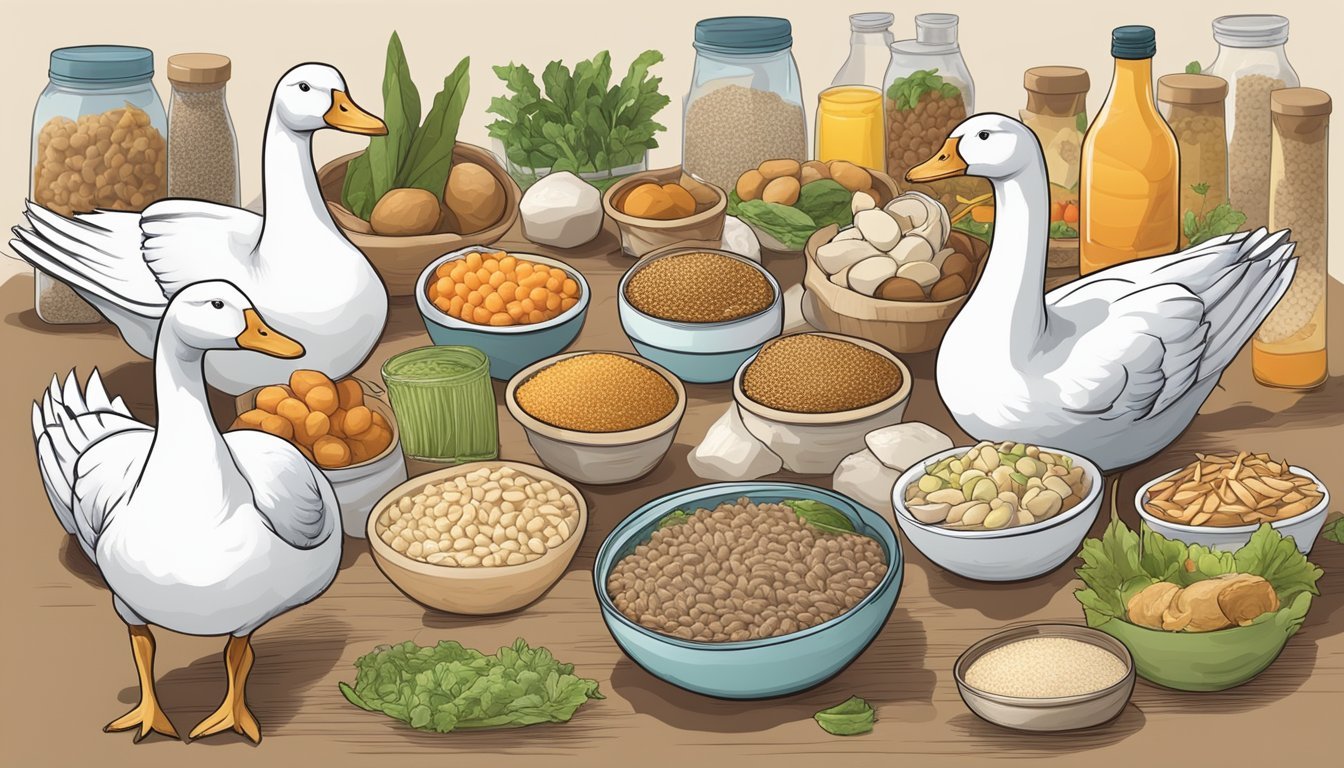Goose Substitutes
Best Alternatives for Cooking
Cooking with goose fat can add a luxurious touch to your dishes, but sometimes it's not always easy to find. Fortunately, there are several excellent substitutes that can provide similar results. For those looking for a neutral-flavored option, refined coconut oil can replace goose fat in a 1:1 ratio. This is great for those seeking a healthier alternative or those who need a higher smoke point for frying.
Unsalted butter is another versatile substitute that gives you control over seasoning. Both unsalted and salted butter can be used at a 1:1 ratio, making them convenient choices for various cooking and baking needs. Butter imparts a richness to dishes similar to goose fat and is a staple in many kitchens.
For those who enjoy a more traditional substitute, lard is worth considering. Its high smoke point makes it perfect for frying, and it works well in both savory and sweet dishes. Lard is particularly beneficial for creating crispy textures, such as in roast potatoes or pie crusts. Each substitute offers unique benefits, ensuring you can achieve delicious results without the need for goose fat.
Understanding Goose Fat
Goose fat, a rendered fat from geese, is prized in many culinary traditions for its savory flavor and cooking versatility.
Flavor Profile: Goose fat imparts a rich, savory taste to dishes. It enhances the meaty flavor of roasted meats and vegetables, making it a sought-after ingredient in both savory and some sweet recipes.
Health Aspects: Goose fat contains a mix of saturated and unsaturated fats. While high in cholesterol, it also includes healthy mono-unsaturated fats. Moderation is key.
High Smoke Point: With a high smoke point of around 375°F-400°F (190°C-200°C), goose fat is excellent for roasting, frying, and sautéing. This property ensures it doesn't burn easily, preserving flavor integrity.
Roasting: Ideal for crispy roasted potatoes or vegetables.
Baking: Adds flakiness to pie crusts and pastries.
Sautéing: Enhances everyday dishes with a rich flavor.
Property Details Type Rendered animal fat Smoke Point 375°F-400°F (190°C-200°C) Flavors Rich, savory, meaty Fat Content Mixture of saturated and unsaturated fats
Goose fat remains a staple in traditional and modern kitchens, valued for its unique taste and functional cooking properties.
Health Considerations of Cooking Fats
Choosing the right cooking fat can impact health in significant ways, affecting everything from cholesterol levels to inflammation.
Saturated vs. Monounsaturated Fats
Saturated fats are found in animal products like butter and lard. Consuming high levels of saturated fats can raise LDL (bad) cholesterol levels, potentially leading to heart disease.
Monounsaturated fats, such as those in olive oil and avocado, can support heart health. These fats lower bad cholesterol and maintain or even increase HDL (good) cholesterol. Including more monounsaturated fats in a diet can contribute to a balanced intake of fats.
Cholesterol and Heart Health
Cholesterol plays a critical role in heart health. Fats like saturated fats can contribute to higher levels of LDL cholesterol. Elevated LDL cholesterol is a risk factor for cardiovascular diseases.
Monounsaturated fats help reduce LDL cholesterol levels. They also have a neutral effect on HDL cholesterol, which is beneficial for heart health.
Foods high in monounsaturated fats include olive oil and canola oil. These should be integrated into a balanced diet to promote cardiovascular health.
Anti-inflammatory Properties
Certain fats possess anti-inflammatory properties. Omega-3 fatty acids, found in fish oils, flaxseeds, and walnuts, are known for their anti-inflammatory benefits. They can help reduce chronic inflammation, which is linked to various diseases.
Monounsaturated fats, particularly those found in olive oil, also have mild anti-inflammatory effects. They contribute to overall health by decreasing markers of inflammation in the body.
Omega-6 fatty acids are another type of polyunsaturated fat. While essential, they should be balanced with omega-3 fatty acids to avoid promoting inflammation. Consuming a mix of omega-3 and omega-6 fats in a balanced diet is ideal for maintaining low levels of inflammation.
Animal-Based Goose Fat Substitutes
Goose fat is popular for its rich flavor and high smoke point, making it ideal for roasting, frying, and baking. These animal-based substitutes offer similar benefits and are readily available.
Duck Fat Alternatives
Duck fat stands out as the closest substitute for goose fat due to its nearly identical composition. It delivers a lovely meaty flavor and caramelized finish, perfect for roast potatoes and other roasted meats.
Smoke Point: High, suitable for frying
Flavor: Rich and savory
Uses: Roasting, frying, sautéing
In Jewish cuisine, duck fat, also known as schmaltz, is often used in traditional dishes like matzo ball soup.
Butter and Ghee
Butter, especially when unsalted, is a versatile substitute, offering a buttery flavor and control over seasoning. Ghee, a clarified butter, has a high smoke point and a nutty taste.
Smoke Point: 32-35°C for butter, higher for ghee
Flavor: Buttery and nutty
Uses: Baking, sautéing, frying
Ghee’s longer shelf life compared to regular butter makes it a convenient option for various dishes, including frying and baking.
Lard and Tallow
Lard (rendered pork fat) and beef tallow provide excellent substitutes for goose fat. They have high smoke points, suitable for frying and roasting, and contribute to flaky pastries and savory dishes.
Smoke Point: High
Flavor: Mild pork flavor (lard), beefy and rich (tallow)
Uses: Frying, roasting, baking
Lard works well in both sweet and savory applications, while tallow is particularly good for frying and roasting meats.
Chicken and Turkey Fat
Chicken fat (schmaltz) and turkey fat are valuable alternatives, especially for those familiar with traditional Jewish cooking. They offer a distinctive taste and are ideal for certain dishes.
Smoke Point: Moderate
Flavor: Rich and poultry-based
Uses: Soups, savory dishes
Schmaltz is commonly used in chicken soup and enhances the flavor of various poultry dishes.
Bacon Fat Variants
Bacon fat, including bacon grease, imparts a smoky and salty flavor, making it a unique substitute for goose fat. It's suitable for adding depth to many dishes.
Smoke Point: Moderate
Flavor: Smoky, salty
Uses: Frying, sautéing, flavoring
Bacon fat can elevate the taste of roasted vegetables, savory pastries, and many meat dishes with its distinct smoky essence.
Plant-Based Goose Fat Alternatives
For those seeking plant-based substitutes for cooking goose fat, various alternatives offer comparable culinary benefits. These options vary in flavor, high smoke point, and health benefits.
Vegetable Oils and Shortening
Vegetable oils such as canola and sunflower oil are excellent plant-based alternatives to goose fat. They have a high smoke point, making them suitable for frying and sautéing. Canola oil is particularly good for baking due to its neutral flavor. Vegetable shortening, like margarine, provides a creamy texture perfect for pastry applications. Both options are vegan-friendly and can be used in a 1:1 ratio to replace goose fat. These oils also boast health benefits, such as being low in cholesterol and rich in polyunsaturated fats.
Olive Oil Substitutions
Olive oil, particularly extra virgin olive oil, is a heart-healthy substitute for goose fat. It is ideal for salad dressings and sautéing vegetables. Light olive oil, with its higher smoke point and neutral flavor, is more suited for frying and roasting. Olive oil's monounsaturated fats and anti-inflammatory properties make it a healthful choice. Note: Olive oil imparts a distinct flavor that might not suit all recipes, but many find its rich, robust taste highly appealing.
Coconut Oil and Its Variants
Refined coconut oil and virgin coconut oil offer different utility in the kitchen. Refined coconut oil is neutral-flavored and has a higher smoke point, making it excellent for frying and sautéing. Virgin coconut oil retains a coconut flavor, which adds a unique touch to baked goods and certain savory dishes. Both types of coconut oil are solid at room temperature, which helps create flaky textures in pastries. They are also rich in good fats, providing healthful alternatives ideal for vegan recipes.
Avocado and Other Fruit Oils
Avocado oil is a versatile substitute for goose fat due to its high smoke point and heart-healthy monounsaturated fats. It is suitable for both high-heat cooking methods such as frying and gentle applications like salad dressings. Other fruit oils, like grapeseed oil, can also be used as neutral-flavored alternatives. These oils often bring added health benefits, including anti-inflammatory properties and benefits for cholesterol levels. Avocado oil, in particular, is prized for its creamy texture that enhances both savory and sweet dishes.
Seed Oils and Their Uses
Seed oils like sunflower and sesame oil are practical goose fat substitutes. Sunflower oil has a high smoke point, making it excellent for roasting and frying. Its neutral flavor ensures it doesn't overpower the dish. Sesame oil, especially the light variant, is good for sautéing and can add a mild nutty flavor. These oils are rich in polyunsaturated fats and are considered healthy for heart and cholesterol levels. They are also vegan and kosher, aligning with various dietary preferences.
Cooking Applications and Techniques
Choosing the right substitute for goose fat can greatly influence the outcome of various cooking methods. The alternatives discussed here are versatile and suited to specific culinary applications.
Baking and Pastry Considerations
In baking and pastry, butter is a popular substitute for goose fat. Unsalted butter offers control over seasoning, while salted butter enhances flavor. Both can be used in a 1:1 ratio. Lard is another excellent choice; it is ideal for creating flaky pie crusts and rich pastries. Ghee can also be used due to its buttery taste and higher smoke point. These options contribute to the texture and flavor required in baked goods and pastries.
Frying and High-Heat Cooking
For frying and high-heat cooking, oils like sunflower, peanut, and canola oil are suitable substitutes for goose fat. These oils have a high smoke point, making them ideal for frying crispy chicken and roasted vegetables. Refined coconut oil is another alternative, although it has a distinct flavor that may affect the overall taste of the dish. Lard, with its high smoke point, is perfect for achieving crispy textures in fried foods.
Roasting Techniques
When it comes to roasting, rendered chicken fat can mimic the light and flavorful properties of goose fat. This makes it a great option for roasting potatoes and other vegetables. Ghee is another suitable choice due to its high smoke point and buttery flavor. These fats can be used in a 1:1 ratio, ensuring that your roasted dishes come out crispy and rich in flavor.
Sauteing and Salad Dressings
For sauteing, unsalted butter, canola oil, and sunflower oil are good substitutes for goose fat. These fats provide a neutral flavor that won't overpower the ingredients. Ghee can also be used for its rich, buttery taste. When making salad dressings, a neutral oil like sunflower or canola is preferable, as it will not alter the salad's delicate flavors.
Stewing and Slow-Cooked Dishes
In stewing and slow-cooked dishes, lard and ghee serve as excellent substitutes for goose fat because they add depth and richness. Chicken fat can also be stored and used for slow-cooking, imparting flavors comparable to goose fat. These alternatives can withstand long cooking times, enriching stews and braised dishes with a satisfying richness.
Culinary Traditions and Flavor Pairings
Exploring various culinary traditions offers insights into unique flavor profiles and versatile substitutes for goose fat. This section covers Mediterranean, American Southern, Asian, and European culinary traditions and their respective flavor pairings.
Mediterranean Cuisine and Olive Oil
Mediterranean cuisine is known for its fresh and robust flavors. Olive oil, a staple in this diet, serves as an excellent substitute for goose fat. The oil's oleic acid content provides a smooth, slightly fruity flavor, making it perfect for savory dishes like roasted vegetables and meats.
Chefs use olive oil in dressings, marinades, and for sautéing. The oil is appreciated not only for its taste but also its health benefits, including heart-health properties. For those aiming to maintain an authentic Mediterranean taste while avoiding animal fats, olive oil offers a versatile and flavorful alternative.
American Southern and Schmaltz
In American Southern cooking, schmaltz—rendered chicken fat—is popular for its rich, savory flavor. This substitute for goose fat is deeply rooted in cultural traditions, often used to enhance the flavor of dishes like matzo ball soup, fried potatoes, and even some baked goods.
Rich in flavor, schmaltz provides a depth that is hard to achieve with more neutral oils. In terms of texture and taste, schmaltz closely mimics goose fat, adding a comforting, home-cooked quality to various dishes. Its use is prominent in recipes handed down through generations, emphasizing tradition and taste.
Asian Cooking and Coconut Oil
In many Asian cuisines, coconut oil is a preferred goose fat substitute due to its unique flavor profile and health benefits. Unlike virgin coconut oil, which has a strong flavor, refined coconut oil offers a neutral taste with a higher smoke point, suitable for cooking at high temperatures.
Coconut oil is used in stir-fries, curries, and baking, adding a mild, slightly sweet undertone to dishes. Its versatility and health benefits, including medium-chain triglycerides (MCTs), make it a favored choice for those looking to substitute animal fats while maintaining a rich flavor in their cooking.
European Baking and Butter Substitutes
European baking often relies on butter and other rich fats to achieve particular textures and flavors in pastries and breads. Unsalted butter is commonly used, providing control over seasoning and a creamy taste that enhances baked goods. In some cases, ghee or clarified butter may be used for its nutty flavor and higher smoke point.
Butter substitutes like margarine or plant-based butters are also used, particularly for those seeking to avoid dairy. These substitutes replicate the richness and moisture retention of traditional butter, ensuring that pastries and breads maintain the desired consistency and flavor. European baking traditions emphasize the importance of these fats in creating iconic, rich flavors.
Practical Tips and Storage
Proper handling and storage of goose fat ensure its longevity and maintain its quality for various cooking applications. Additionally, there are budget-friendly alternatives to consider for those mindful of costs without sacrificing flavor or functionality.
Extending Shelf Life
Goose fat has a relatively long shelf life due to its high saturated fat content. To maximize its longevity, store it in an airtight container and keep it refrigerated. It can stay fresh for up to six months in the fridge. For longer storage, consider freezing the fat. Frozen goose fat can last up to a year without losing quality. Ensure to label the container with the date to track its freshness effectively. This is especially useful for those who render their own fat after cooking goose at home.
Proper Storage Methods
When it comes to storing goose fat, choosing the right container is essential. Glass jars with tight-fitting lids are ideal, as they prevent oxidation and preserve the fat's flavor. Make sure to cool the fat before sealing if it has been rendered from cooking. Store the jar in the coldest part of the refrigerator. If freezing, use a freezer-safe container and leave some space at the top as the fat expands when frozen. Labeling and dating each container help in maintaining an organized storage system.
Budget-Friendly Alternatives
For those who find goose fat to be a bit pricey or less accessible, there are several budget-friendly substitutes. Lard is a versatile option that works well in both cooking and baking. Duck fat is another excellent alternative, similar to goose fat in flavor and cooking properties. Refined coconut oil offers a plant-based substitute with a high smoke point, making it suitable for frying and roasting. Schmaltz (chicken fat) can also be a viable alternative, especially in savory dishes. These substitutes offer similar benefits and can be more economical, helping maintain culinary quality without overspending.
Nutritional Profiles and Health Impacts
Goose substitutes can provide a comparable nutrient profile and health benefits without many of the associated risks linked to red meat. They often offer essential fatty acids, lower cholesterol levels, and a balanced vitamin intake.
Essential Fatty Acids and Vitamins
Goose substitutes generally contain a good balance of essential fatty acids, including omega-3 and omega-6. These fats play a crucial role in maintaining heart health and reducing inflammation.
In terms of vitamins, goose substitutes can be rich in Vitamin E, a powerful antioxidant that helps combat oxidative stress. Vitamin B12, usually found in animal products, might be lower in plant-based alternatives, making it crucial for consumers to ensure adequate intake from other sources or fortified products.
Comparing Calories and Fat Contents
When comparing calorie and fat content, goose substitutes often provide fewer calories and lower levels of saturated fats. Traditionally, goose meat is high in both, which may raise health concerns.
Plant-based alternatives tend to be lower in total fat but often include beneficial monounsaturated fats. These are healthier fats that support heart health. Consumers looking to manage their weight may find these substitutes a more suitable option for maintaining a balanced diet without compromising on taste or texture.
Impact on Cholesterol and Diet
Cholesterol levels can be significantly influenced by the choice between traditional goose and its substitutes. Regular consumption of goose meat could lead to elevated cholesterol due to high saturated fat content.
Substitutes, particularly plant-based ones, contribute to lower cholesterol levels. This is attributed to their minimal saturated fat content and the presence of components like fiber, which helps in reducing bad cholesterol. This makes them a healthier choice for those monitoring dietary cholesterol and aiming for a heart-healthy diet.
The balanced inclusion of essential fatty acids in these substitutes supports cardiovascular health without the adverse effects typically associated with high-cholesterol foods.










